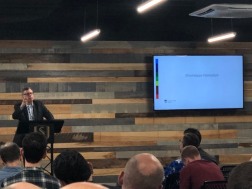 I spoke at the “Linguistics and New Testament Greek: Key Issues in the Current Debate” conference held at Southeastern Baptist Theological Seminary in Wake Forest, North Carolina, on April 26-27. The conference organizers, Ben Merkle and David Alan Black, were masterful in coordinating the two days of speakers, attended by about two hundred or more people. The meals together with my fellow presenters were especially enjoyable.
I spoke at the “Linguistics and New Testament Greek: Key Issues in the Current Debate” conference held at Southeastern Baptist Theological Seminary in Wake Forest, North Carolina, on April 26-27. The conference organizers, Ben Merkle and David Alan Black, were masterful in coordinating the two days of speakers, attended by about two hundred or more people. The meals together with my fellow presenters were especially enjoyable.
The conference was designed to bring attendees up to date on a variety of topics in contemporary New Testament Greek studies. My paper was on “Linguistic Schools.” In this paper, I first raised the question of what constitutes a linguistic school. There are various definitions and ways of dividing up the schools that exist. I treated those that have had substantial linguistic research in both linguistic theory and biblical monographs. Before treating contemporary schools, I first discussed traditional grammar and the two major periods of language study before the modern linguistic period. These two periods, the rationalist and the comparative historicist, are still important to note, because many of our language tools in New Testament studies are written from these standpoints. I then covered six other modern linguistic schools, organized as formalist, cognitive, and functional schools. I treated Chomskyan Formalism and Construction Grammar under formalist schools, Cognitive Linguistics and Relevance Theory under cognitive schools, and Cognitive-Functionalism and Systemic Functional Linguistics under functional schools.
I could say much more about these various linguistic schools, such as their relative strengths and weaknesses, or their relationships with each other. These are worth discussing, as many biblical scholars seem to think that one can simply pick and choose bits and pieces from each of these. I don’t think that the situation is quite that way or that easy. I concluded by raising questions regarding the commensurability of these schools. I believe that those linguistic schools that are closer together, such as within a broad category, are probably more compatible than those that are in different categories. I enjoyed preparing this lecture and think that it gave a solid overview of the major voices in the current discussion to help guide the uninitiated.
I enjoyed hearing several very fine papers that fulfilled the expectation of offering a summary of the current state of discussion of a topic and a balanced presentation of the various positions. The best in this regard were on “Tense and Aspect” by Constantine Campbell and on “Voice (Including Deponency)” by Jonathan Pennington. Campbell gave an excellent summary of the development of discussion on tense and aspect and gave a comprehensive survey of the participating views. Pennington concentrated on the middle voice and deponency, but that is where most of the discussion has occurred over the last several years.
I am not sure that all of the other papers fit within the scope of the agenda of the program or gave as robust a presentation of all of the varied views as I thought was being asked of us as presenters. However, perhaps the authors will be revising their papers in preparation for publication by Baker Academic.
In any case, I was very thankful to be asked to participate in this very well-organized conference and to see a number of my friends and colleagues in New Testament Greek study.
— Stanley E. Porter

Reblogged this on Talmidimblogging.
LikeLike
It was a pleasure, Stan.
LikeLike
Mike, great to see you as well.
— Stan
LikeLike
I am a PhD student in Biblical Studies at Lancaster Bible College Capital Seminary. I have watched several of the lectures from this conference, including the one from you, Dr. Porter. they have all been challenging, insightful, and informative. I wondered why discourse analysis and linguistic related ideas were not taught when I first studied NT Greek. Embracing these ideas with regard to how human language works, is powerful when considering God used human language to convey his inspired word to us! Wow!
LikeLiked by 1 person
I am glad you have enjoyed the lectures. Thanks for mentioning mine. Have you seen the book that came out of the conference? You will probably enjoy it as well.
You ask a good question regarding the teaching of Greek and the approaches that have been used and can be used. You probably gathered from my lecture that I think that there are many advances in language study that could benefit our study of Greek and how we examine the New Testament. There has been a lot of resistance to the use of linguistics even though there have also been some major advances especially in technical work.
I hope that your doctoral work is able to incorporate some of these advances in Greek study.
— Stan
LikeLike